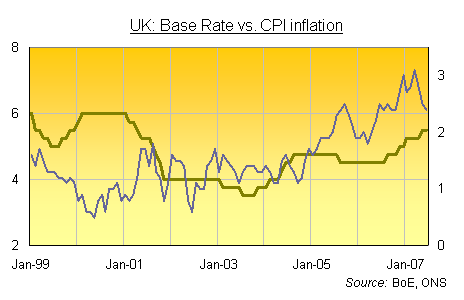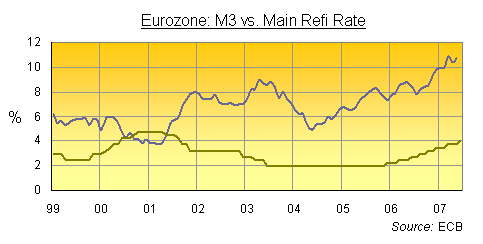Central Bankers - Stop! Or the Economy Gets It
Economics / Inflation Jul 20, 2007 - 04:19 PM GMTBy: Adrian_Ash
"...If only consumers hadn't taken the world's central bankers at their word..."
WE ONLY have ourselves to blame. Consumers in the West, rich in credit ratings if not cash, shouldn't have borrowed and spent so much money when interest rates hit a half-a-century low in 2003.
Nor should we have continued to borrow and spend when the rate of interest slipped below the inflation rate – making debt pay as cash savings lost value – over the next two years.
And we really should have then spurned all those super-low teaser mortgages...0% charge cards...and money-back deals on shiny new SUVs...when the global money supply began to balloon between 2005 and 2007.
If the cost of living suddenly shoots higher, then our monetary masters at the West's central banks will stand ready to say: "Told you so!" Because they themselves, of course, have got nothing to do with the problem.

"The sooner households begin to acknowledge the consequences of higher interest rates," warned Bank of England member Tim Besley in a speech this week, "the greater is the chance of a smooth adjustment towards a level of consumption consistent with maintaining the inflation target in the medium term."
In other words, "Stop – or the economy gets it!" And Besley's logic, like his task as a central banker, is simple enough.
The more people spend, the more they risk pushing up prices. He might have been wagging his finger at consumers across the Atlantic as well as in the United Kingdom – along with households in Australia , New Zealand , South Africa , Spain , Ireland ...
Wherever household debt has exploded, funding an explosion in house prices and consumptive debt, the solution looks clear: Make money dearer, and inflation will recede. Indeed, "it is a widely accepted proposition in the economic profession," as the European Central Bank notes in its most recent policy statement, "that a change in the quantity of money in the economy will be reflected in a change in the general level of prices."
The task of central banking, in short, is to maintain the quality of money – preserving its purchasing power – by controlling the quantity that's sloshing around.
Right?

Trouble is, the Western world's central bankers don't seem to have much control over the very mechanism that they claim turns higher interest rates into lower inflation. The supply of money – the actual quantity of cash and near-cash financial instruments sloshing around the globe – has shot higher even as the Fed, Bank of England and ECB in Europe have begun making debt more expensive.
Classically defined, inflation means exactly this kind of growth in the quantity of money. Capping it with higher borrowing costs makes sense in theory. That was how central bankers led by Paul Volcker at the Federal Reserve finally got round to killing the Great Inflation of the late 1970s. It took them more than one attempt, too.
"By the end of the 1970s and the early 1980s a number of the leading central banks acted more forcibly against inflation," Volcker said in a speech 10 years later. "They acted in the only way they effectively could, by restricting the overall growth of money and credit."
Problem was, "as the restraint took hold, one country after another was caught up in recession or an extended period of stagnation" – and even central bankers need to make their mortgage repayments each month. Raising interest rates to slow inflation will never be popular. Raising them so far that your neighbors lose their lose jobs is a tough call to 'fess up to at your local barbecue.
"Many government officials throughout the free world became monetarists in the 1970s," writes David Hackett Fischer in his grand history of price inflations, The Great Wave . "Major efforts were made by the Federal Reserve Board in the United States and the Bank of England in the United Kingdom to stabilize their disordered economies by regulating the money supply. These efforts were not successful and actually increased instabilities."
"Economist Milton Friedman raged against the errors of his own disciples," notes Hackett Fischer, "repeatedly accusing the governors of the Federal Reserve System and the Bank of England of grievous incompetence."
But as John Kenneth Galbraith commented, "An economic policy needs to be within the competence, however limited, of those available to administer it." In other words, a solution proposed is no solution at all if it proves impossible in practice – and perhaps a return to some kind of Gold Standard would prove to be just such a non-solution today.
Limiting the growth of world money supplies to the 1.3% growth in above-ground gold stocks each year, a Gold Standard might seem the only solution to our brave new century's insane bubble in credit and debt. Tinkering with interest rates has done nothing to slow the current boom in world credit and debt.
"The global derivatives market grew nearly 40% in 2006," as Robert Rodriguez of First Pacific Advisors, an $11-billion investment fund, noted in a speech to the CFA Society of Chicago late last month. "The amount of contracts based on bonds more than doubled to $29 trillion. The actual money at risk through credit derivatives increased 93% to $470 billion, while that amount for the entire derivatives market was $9.7 trillion.
"The International Monetary Fund, in its April 2006 Global Financial Stability Report, estimated that credit-oriented hedge fund assets grew to more than $300 billion in 2005," Rodriguez went on, "a six-fold increase in five years. When levered at five to six times, this represents $1.5 to $1.8 trillion deployed into the credit markets."
Squashing the global supply of what now passes for money into the even broadest measure of world gold holdings – the outstanding stock of 153,000 tonnes now reckoned to sit above ground – might just mean destroying the economy first. That's why, like the fake monetarism practiced by central bankers in the late '70s, it's unlikely to work. Just try getting a Gold Standard past Congress...no matter how bad inflation becomes! Asking politicians to defend the value of money would be like getting David Beckham
But that's not to say gold doesn't hold a monetary value today. The only question for investors and savers: Why wait for the rest of the world to catch on?
If the bubble in credit and money hadn't grown so large in the first place, we wouldn't need to defend ourselves with a lump of shiny yellow metal. But perhaps that's where we've got to, awaiting the whirlwind now due after sowing so much bad debt.
By Adrian Ash
BullionVault.com
Gold price chart, no delay | Gold prices live | Latest gold market news
City correspondent for The Daily Reckoning in London and a regular contributor to MoneyWeek magazine, Adrian Ash is the editor of Gold News and head of research at www.BullionVault.com , giving you direct access to investment gold, vaulted in Zurich , on $3 spreads and 0.8% dealing fees.
(c) BullionVault 2007
Please Note: This article is to inform your thinking, not lead it. Only you can decide the best place for your money, and any decision you make will put your money at risk. Information or data included here may have already been overtaken by events – and must be verified elsewhere – should you choose to act on it.
Adrian Ash Archive |
© 2005-2022 http://www.MarketOracle.co.uk - The Market Oracle is a FREE Daily Financial Markets Analysis & Forecasting online publication.



